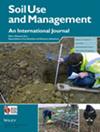The misconception of soil organic carbon sequestration notion: when do we achieve climate benefit?
IF 3.7
3区 农林科学
Q1 SOIL SCIENCE
引用次数: 0
Abstract
Soil organic carbon (SOC) sequestration is a key function of natural and semi‐natural ecosystems. Restoring this property in terrestrial ecosystems has become central to the EU's climate change mitigation and adaptation strategies. However, SOC sequestration is a widely misunderstood concept. The different methodological approaches used to investigate and compare SOC stock under sustainable agricultural practices play a key role in reinforcing misconceptions about this complex process. This commentary paper aims not only to provide a clear definition of SOC sequestration, but also to interpret the results that can be obtained for SOC stock change estimation using the SOC stock difference and the pair comparison methods, as well as to identify the soil carbon‐related processes that achieve climate mitigation. SOC sequestration can be defined as the progressive increase in a site's SOC stock compared to pre‐intervention via a net depletion and transfer of atmospheric CO2 into the soil, where it is retained as soil organic matter (SOM), by plants, plant residues or other organic solids such as the material derived from the organic fraction of farming solid waste, which can be used as a fertilizer (e.g., manure, compost, biochar, digestate), and that is produced or derived from that land‐unit. To date the most appropriate way to determine if a land unit's soil is a sink or rather a source of atmospheric CO2 is to implement the SOC stock difference method, provided the non‐occurrence of carbon exchange between ecosystems.土壤有机碳固存概念的误区:何时实现气候效益?
土壤有机碳(SOC)固存是自然和半自然生态系统的一项关键功能。恢复陆地生态系统的这一特性已成为欧盟减缓和适应气候变化战略的核心。然而,SOC 固碳是一个被广泛误解的概念。用于调查和比较可持续农业实践下 SOC 储量的不同方法在加深对这一复杂过程的误解方面起到了关键作用。本评论文章不仅旨在为 SOC 固碳提供一个清晰的定义,还旨在解释使用 SOC 储量差异法和成对比较法估算 SOC 储量变化所能获得的结果,以及确定实现气候减缓的土壤碳相关过程。SOC 固碳可定义为,与干预前相比,通过大气二氧化碳的净消耗和转移到土壤中,植物、植物残体或其他有机固体(如从农业固体废弃物的有机部分中提取的物质)将其作为土壤有机质(SOM)保留在土壤中,可用作肥料(如粪肥、堆肥、生物炭、沼渣),并由该土地单元产生或衍生,从而使该地点的 SOC 储量逐步增加。迄今为止,确定一个土地单元的土壤是大气二氧化碳的汇还是源的最合适方法是采用 SOC 储量差异法,前提是生态系统之间不存在碳交换。
本文章由计算机程序翻译,如有差异,请以英文原文为准。
求助全文
约1分钟内获得全文
求助全文
来源期刊

Soil Use and Management
农林科学-土壤科学
CiteScore
7.70
自引率
13.20%
发文量
78
审稿时长
3 months
期刊介绍:
Soil Use and Management publishes in soil science, earth and environmental science, agricultural science, and engineering fields. The submitted papers should consider the underlying mechanisms governing the natural and anthropogenic processes which affect soil systems, and should inform policy makers and/or practitioners on the sustainable use and management of soil resources. Interdisciplinary studies, e.g. linking soil with climate change, biodiversity, global health, and the UN’s sustainable development goals, with strong novelty, wide implications, and unexpected outcomes are welcomed.
 求助内容:
求助内容: 应助结果提醒方式:
应助结果提醒方式:


